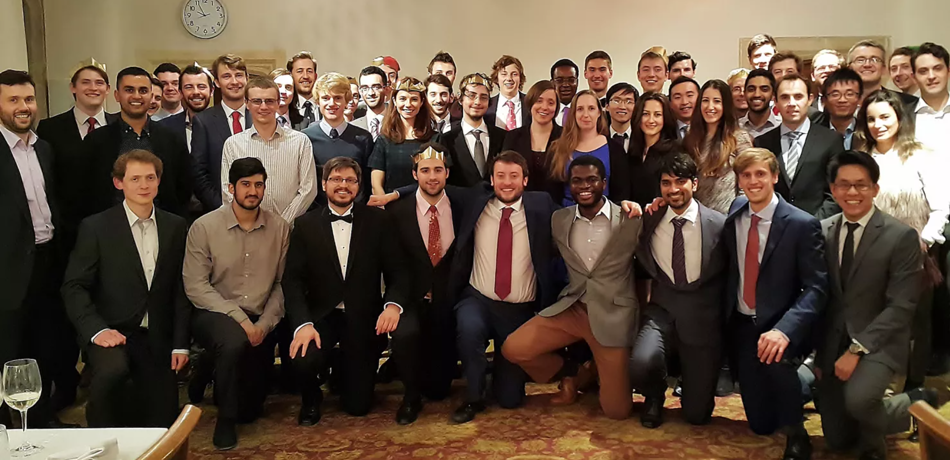Oxford Thermofluids Institute | The Institute - CDT in Future Flight & Propulsion

CDT in Future Flight and Propulsion


The DPhil offered by this EPSRC funded Centre for Doctoral Training (CDT) in Future Propulsion and Power provides graduates with the opportunity to develop in-depth knowledge, understanding and expertise in aircraft propulsion and gas turbines. This is a joint programme between the Universities of Cambridge, Oxford and Loughborough, together with leading engine manufacturers and partners in the field such as Rolls-Royce plc and Siemens.
The CDT programme provides a unique research training opportunity for the next generation of graduate engineers in aerospace propulsion, by bringing together diverse areas of expertise to train future aerodynamics engineers in a supportive and exciting environment.
The programme will help graduate engineers understand and address the issues faced in current and future engine designs, and to develop solutions using innovative and integrated methods. Further information on how to apply can be found here and general information about the CDT can be seen at www.turbocdt.org. The CDT maintains close partnerships with several leading companies, including Rolls Royce and Siemens. If your company would like to investigate industrial partnerships with the CDT then please contact us here.
Further details
Research Themes
- Sustainable Aviation
- Aerodynamics and Heat Transfer
- Combustion-Turbine Interaction and Integration
- Computational Fluid Dynamics
- Instrumentation and measurement for engine realistic conditions
- Combustion-Turbine Interaction and Integration
- Fluid-Solid Aerothermal and Aeromechanical Interactions
- Coupling and Interactions between Turbine Internal and External Flows
- Advanced Seals Characterization and Component Matching/Interaction
- Multistage Turbine Aerothermal Interactions
- Multi-scale Multi-fidelity Aerothermal Modelling
In the first year, all students study for a master’s degree in Future Propulsion and Power at the University of Cambridge. In years two to four, Oxford's students will undertake industrially-focussed projects at the Oxford Thermofluids Institute in the Department of Engineering Science.
Year one is oriented towards developing your knowledge base. Along with CDT students from Cambridge and Loughborough, you will register and study for an MRes degree in Future Propulsion and Power at the University of Cambridge. The course involves taught lectures and laboratory modules, along with several mini projects of two to three weeks each undertaken at the three partner universities and at some of the sites of the industrial partners. These are precursors to your DPhil study, to hone your research skills and shape your main research area. You will meet your supervisor regularly to assess progress and discuss academic issues.
Years two to four see an increasing emphasis on individual research. Oxford's students register for the degree of DPhil and carry out a research project at the Oxford Thermofluids Institute, an internationally-recognised centre for research in Gas Turbine Heat Transfer and Aerodynamics, and part of Oxford’s Department of Engineering Science. You will benefit from the network of leading experts in the field, and develop a portfolio of academic, laboratory and career-oriented skills. Throughout of the research project, close interaction with an industrial partner is expected. In addition, the full cohort meets regularly for CDT seminars and workshop events.
Entry into the CDT programme is competitive and will take account of academic qualifications, performance and aspirations. Successful applicants are likely to have an engineering background with some specialisation in fluid mechanics and thermodynamics. Candidates with undergradaute degrees from other related fields will also be considered. Students are expected to 1st class or strong 2.1 honours degree from a UK University or an equivalent standard from an overseas university.
The majority of successful applicants must be eligible for EPSRC funding for Home students but a small number of places may also be available to those with different funding sources. Each candidate will need to get accepted by both Oxford (DPhil) and Cambridge (MRes). Please note that although you will start the CDT program in Year 1 at Cambridge, your admission to the MRes at Cambridge will be conditional on your obtaining a conditional offer of a DPhil place at Oxford for Years 2-4.
Annually, there will be 4-5 funded places for those who will complete their Years 2-4 of the CDT program at Oxford. If you are interested, please visit the relevant Oxford and Cambridge websites for applications and start the process as soon as possible. You are also encouraged to contact relevant supervisors before making the application if you have preference of particular research areas/topics for the DPhil phase.
The application procedure for the MRes at Cambridge can be found from https://www.turbocdt.org/my-application/.
The application procedure for the DPhil at Oxford can be found at this link https://www.ox.ac.uk/admissions/graduate/courses/future-propulsion-power?wssl=1.
Please make clear on your application that it is for ‘CDT in Gas Turbine Aerodynamics’ (as a research project title or field of research). At this application stage, you can specify either the CDT supervisor group or an academic member of staff as your proposed supervisor.
Oxford CDT Director
Professor Peter Ireland: peter.ireland@eng.ox.ac.uk
CDT Administrator
Alex Weaving: alex.weaving@eng.ox.ac.uk
Oxford Thermofluids Institute Faculty

